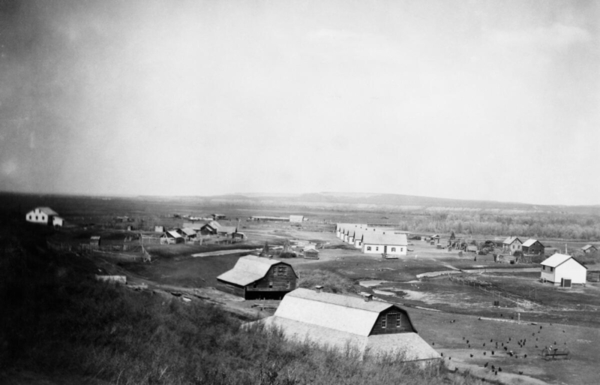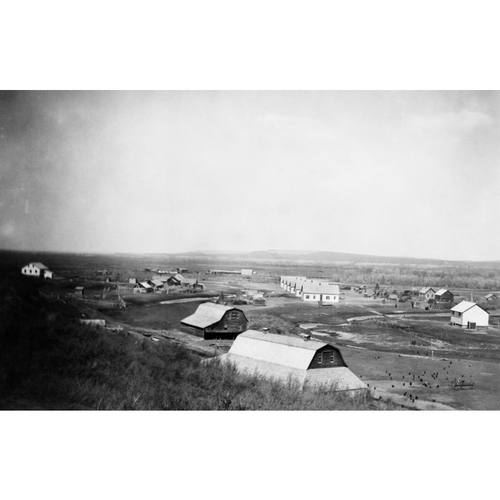
Source: Link
WALTER, ELIAS, farmer, Hutterite elder, antiquarian, and bookbinder; b. 8 Aug. 1862 in Russia (Ukraine), son of Jacob Walter; m. 20 Nov. 1886 Elizabeth Hofer, probably in the Wolf Creek Colony near Freeman (S. Dak.), and they had at least 12 children, of whom seven daughters and three sons lived to adulthood; d. 26 May 1938, probably in the Standoff Colony near Lethbridge, Alta.
Elias Walter was an influential elder in the Dariusleut branch of the communal Hutterian Brethren, and the first Hutterite minister to reside in Canada. He spent the last 20 years of his life in Alberta’s Standoff Colony, where he became a leading figure among Canadian Hutterites because of his administrative and relationship-building skills as well as his concern that the history of his people be preserved for future generations.
Walter was born into a religious sect established by Jakob Hutter, an Anabaptist from Tyrol (South Tyrol, Italy) who was burned at the stake in Innsbruck (Austria) during a campaign of religious persecution in 1536. In addition to advocating the pacifist philosophy, agricultural lifestyle, and preference for isolation from society common in Anabaptist denominations, Hutter preached communal living, which would become a distinguishing characteristic of Hutterite settlements. When Elias Walter was born in 1862, his parents lived in a communal village in Ukraine, which was then part of the Russian empire. He was 12 years old when the Hutterites began emigrating to the United States to escape assimilationist laws instituted by Tsar Alexander II. Over a five-year period 1,254 Hutterites, almost the entire population of the sect, participated in this mass exodus.
Elias and his family departed in 1874 with the first group to leave Russia. After arriving in the Dakota Territory, they settled in the newly created Wolf Creek Colony, where Elias’s uncle Darius Walter founded the Dariusleut, one of the three Hutterite branches formed in the territory in the 1870s. The others were the Lehrerleut, named for lehrer, or teacher, Jacop Wipf, and the Schmiedeleut, named for schmied, or blacksmith, Michael Waldner. (Those Hutterites who chose to live on individual farms became known as the Prairieleut, or Prairie People, and rapidly assimilated into American society.) Elias Walter would be a member of the Wolf Creek Colony for over 40 years. In 1886 he married Elizabeth Hofer, with whom he had a large family. Following in his uncle’s footsteps, he was ordained minister in 1898.
During the First World War, Walter represented the Hutterites – whose religion forbade them to participate in military conflicts – in difficult discussions with the administration of President Woodrow Wilson. Walter helped draft a petition to the president in which he and his co-religionists requested alternative service opportunities and pledged that they were “quite willing to do something for the good of the country, providing that it is not against our conscientious convictions.” Their petition was rejected. Hutterites were drafted into the armed forces and were required to drill and dress in uniform. States in which they lived outlawed the use of German in church services, and livestock were stolen from one South Dakota colony. To escape such discrimination against German-speaking people and pacifists, many Hutterites fled to Canada, and in 1918 Walter became the first minister to join them there, settling in the Standoff Colony southwest of Lethbridge. Ten years later he was elected elder of the Dariusleut. Its members totalled about one-third of the communal Hutterites, who had also founded colonies in Saskatchewan and Montana.
It was not only Walter’s leadership of the Dariusleut that made him an important figure among his people in the first half of the 20th century, but also his lifelong interest in collecting significant Hutterite and Anabaptist historical works. Most important was his discovery, in 1889, of a copy of the original Hutterite chronicle, written in the 16th century, which he found at a Schmiedeleut colony in South Dakota. Determined to make it available to others, Walter painstakingly copied it by hand, word for word, three times to ensure that the text would be preserved. He then transferred a copy to Rudolf Wolkan, a literature professor in Vienna, who published it in 1923 as Geschicht-Buch der Hutterischen Brüder [The chronicle of the Hutterian Brethren]. Walter’s collection also included copies of Peter Riedemann’s Rechenschaft … [Confession of faith] and Peter Walpot’s Das Grosse Artikelbuch [Great article book], both dating from the 16th century, as well as many historic hymns, epistles, and sermons. An expert bookbinder, Walter compiled a substantial catalogue of his holdings and developed a close connection with Mennonite historian John Horsch, a European immigrant to the United States who served as an intermediary with other scholars and ensured that a number of Hutterite works were published.
In the fourth volume of the Mennonite encyclopedia, published in 1959, authors Robert Friedmann and Harold Stauffer Bender note Walter’s “indefatigable activity” and compare his significance in preserving Hutterite culture to that of Hutterite leaders such as Andreas Ehrenpreis in the 17th century and Johannes Waldner in the 18th century. Walter compiled, for example, the hymnals Die Lieder der Hutterischen Brüder [Songs of the Hutterian Brethren] (Scottdale, Pa, 1914) and Gesangbüchlein … [Little songbook] (Scottdale, 1919), both of which would still be widely used by colonies in North America, Nigeria, and Japan in the early years of the 21st century. His work has thus been important for all branches of the Hutterian Brethren.
Elias Walter’s influence extended beyond the Hutterites and Mennonites. He was instrumental in making contact with the German theologian Eberhard Arnold, who had established an Anabaptist commune called the Bruderhof in Germany in the early 1920s. Arnold, who wanted to become a member of the more established Hutterites, visited all their colonies in North America between 1930 and 1931. His journal includes hundreds of references to Walter, who often accompanied him. In his entry of 2 Oct. 1930 Arnold writes, “I feel a warm love for Elias Walter, the venerable champion who has guided our path.… [He] is, for his sixty-eight years, youthfully active and daring.… Walter, a self-taught layman, is a true scholar. He appreciates my studies so much that he tries in every possible way to provide me with the necessary quiet.” In December Walter rebaptized Arnold and presided over his ordination as a minister in the Hutterite Church.
On 20 Jan. 1931 Arnold records that Elias Walter had “collapsed at the end of his teaching in the middle of a solemn meeting.” He was taken to a Turkish bath in Calgary, and the treatment he received there allowed him to “go home somewhat strengthened.” Walter died seven years later, at the age of 75. The Bruderhof and the Hutterites were merged institutionally from 1931 to 1955 and from 1974 to 1992, when the relationship ended owing to differences of opinion about beliefs and practices. More than a century after Walter became the first Hutterite minister in Canada, the Hutterian Brethren were still thriving there, with over 300 colonies spread across the country’s four westernmost provinces.
An extensive collection of correspondence between Elias Walter and John Horsch is preserved at the Mennonite Church USA Arch. (Elkhart, Ind.), HM1/008 (John Horsch papers, 1873–1966). Many of Walter’s letters to Eberhard Arnold are transcribed in Brothers unite … (Ulster Park, N.Y., 1988), which was translated and edited by the Hutterian Brethren. The GA holds several digitized photographs of Hutterite settlements in Canada, including a 1920 image of the Standoff Colony (NA-2635-52).
The chronicle of the Hutterian Brethren, trans. and ed. Hutterian Brethren (2v., Rifton, N.Y., and Ste. Agathe, Man., 1987–98), 2. “Dariusleut family record list,” comp. D. S. Wipf (Cranford, Alta, 2006). Die Lieder der Hutterischen Brüder … [Songs of the Hutterian Brethren …], ed. Hutterite Brethren (Scottdale, Pa, 1914). Robert Friedman and H. S. Bender, “Walter, Elias, Jr. (1862–1938),” in The Mennonite encyclopedia: a comprehensive reference work on the Anabaptist-Mennonite movement (5v., Hillsboro, Kans., 1955–90), 4: 882–83. John Horsch, The Hutterian Brethren, 1528–1931, and the principle of nonresistance as held by the Mennonite Church (New York and London, 1971). J. A. Hostetler, Hutterite society (Baltimore, Md., and London, [1974]). Rod Janzen, The prairie people: forgotten Anabaptists (Hanover, N.H., 1999). Rod Janzen and Max Stanton, The Hutterites in North America (Baltimore, 2010). V. J. Youmans, The plough and the pen: Paul S. Gross and the establishment of the Spokane Hutterian Brethren (Boone, N.C., 1995).
Cite This Article
Rod Janzen, “WALTER, ELIAS,” in Dictionary of Canadian Biography, vol. 16, University of Toronto/Université Laval, 2003–, accessed February 21, 2026, https://www.biographi.ca/en/bio/walter_elias_16E.html.
The citation above shows the format for footnotes and endnotes according to the Chicago manual of style (16th edition). Information to be used in other citation formats:
| Permalink: | https://www.biographi.ca/en/bio/walter_elias_16E.html |
| Author of Article: | Rod Janzen |
| Title of Article: | WALTER, ELIAS |
| Publication Name: | Dictionary of Canadian Biography, vol. 16 |
| Publisher: | University of Toronto/Université Laval |
| Year of publication: | 2023 |
| Year of revision: | 2023 |
| Access Date: | February 21, 2026 |



